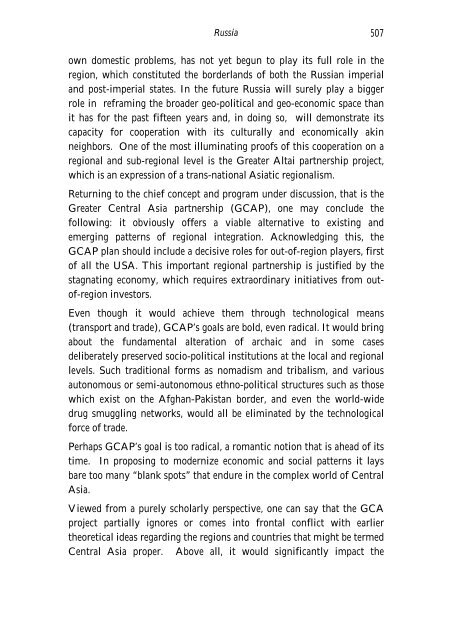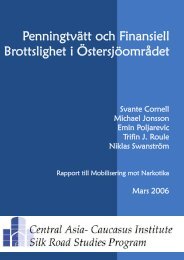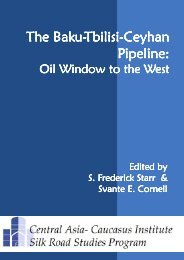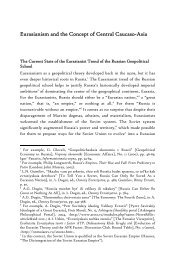Russia - Central Asia-Caucasus Institute and Silk Road Studies ...
Russia - Central Asia-Caucasus Institute and Silk Road Studies ...
Russia - Central Asia-Caucasus Institute and Silk Road Studies ...
Create successful ePaper yourself
Turn your PDF publications into a flip-book with our unique Google optimized e-Paper software.
<strong>Russia</strong> 507<br />
own domestic problems, has not yet begun to play its full role in the<br />
region, which constituted the borderl<strong>and</strong>s of both the <strong>Russia</strong>n imperial<br />
<strong>and</strong> post-imperial states. In the future <strong>Russia</strong> will surely play a bigger<br />
role in reframing the broader geo-political <strong>and</strong> geo-economic space than<br />
it has for the past fifteen years <strong>and</strong>, in doing so, will demonstrate its<br />
capacity for cooperation with its culturally <strong>and</strong> economically akin<br />
neighbors. One of the most illuminating proofs of this cooperation on a<br />
regional <strong>and</strong> sub-regional level is the Greater Altai partnership project,<br />
which is an expression of a trans-national <strong>Asia</strong>tic regionalism.<br />
Returning to the chief concept <strong>and</strong> program under discussion, that is the<br />
Greater <strong>Central</strong> <strong>Asia</strong> partnership (GCAP), one may conclude the<br />
following: it obviously offers a viable alternative to existing <strong>and</strong><br />
emerging patterns of regional integration. Acknowledging this, the<br />
GCAP plan should include a decisive roles for out-of-region players, first<br />
of all the USA. This important regional partnership is justified by the<br />
stagnating economy, which requires extraordinary initiatives from outof-region<br />
investors.<br />
Even though it would achieve them through technological means<br />
(transport <strong>and</strong> trade), GCAP’s goals are bold, even radical. It would bring<br />
about the fundamental alteration of archaic <strong>and</strong> in some cases<br />
deliberately preserved socio-political institutions at the local <strong>and</strong> regional<br />
levels. Such traditional forms as nomadism <strong>and</strong> tribalism, <strong>and</strong> various<br />
autonomous or semi-autonomous ethno-political structures such as those<br />
which exist on the Afghan-Pakistan border, <strong>and</strong> even the world-wide<br />
drug smuggling networks, would all be eliminated by the technological<br />
force of trade.<br />
Perhaps GCAP’s goal is too radical, a romantic notion that is ahead of its<br />
time. In proposing to modernize economic <strong>and</strong> social patterns it lays<br />
bare too many “blank spots” that endure in the complex world of <strong>Central</strong><br />
<strong>Asia</strong>.<br />
Viewed from a purely scholarly perspective, one can say that the GCA<br />
project partially ignores or comes into frontal conflict with earlier<br />
theoretical ideas regarding the regions <strong>and</strong> countries that might be termed<br />
<strong>Central</strong> <strong>Asia</strong> proper. Above all, it would significantly impact the






